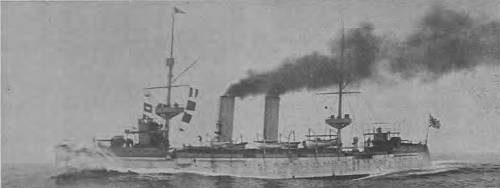- Author
- Swan, W.M., Lietutenant Commander, RAN
- Subjects
- Naval Intelligence
- Tags
-
- RAN Ships
- None noted.
- Publication
- September 1974 edition of the Naval Historical Review (all rights reserved)
Towards the middle of last century the Tokugawa’s grip began to weaken, as certain people began to look more and more to Kyoto. Commodore Perry’s arrival in 1853 pierced the curtain, and with the Americans, followed closely by the British, Russians, Dutch and French arriving on the scene, the Shogunate crumbled. The result was the Meiji Restoration of 1868-9, when the 16- year-old Emperor, Meiji ascended his rightful throne and became the real sovereign of Japan, which he proceeded to rule for 45 years with dignity, in a period known as the ‘Victorian Age of Japan’, and also as the ‘Golden Age of Japanese Intelligence’.
Thus, at the beginning of the period we are covering, Japan burst upon a startled world in an amazing transformation from a savage fortress to a world power. Deciding, perhaps wisely, perhaps not, as events will show, not to despise the barbarians of the West (like China), but to copy them, Japan became a powerful nation in one and a half generations.
Far from being forbidden to leave Japan, Japanese went all over the world noting, copying and photographing anything that might be of use to them in their race to rule Asia – for, make no mistake about it, that was their aim, or their first aim.
The country became Westernised, industrialised, and militarised in a speed not thought possible. A child’s song composed in 1878, known as the ‘Civilization Ball Song’, was sung by children all over Japan as they bounced a ball ten times, and recited the ten desirable Western objects of gas-lamps, steam-engines, horse-carriages, cameras, telegrams, lightning-conductors, newspapers, schools, letter-post, and steamships.
Yet, while Japan’s spies for progress tramped the world engaged in polite intelligence, a more sinister undercurrent ran strongly – State Shintoism (already referred to), from which flowed the incredible intelligence story you are about to hear.
The three main tenets of State Shintoism were:
1. The Emperor is divine, and derives his divinity from his great ancestors, etc.
2. The gods have Japan under their special protection, therefore its people, and its very soil, and everything in it, are superior to all others.
3. These attributes place upon Japan a divine mission to bring the whole world under one (Hakko Ichiu) roof, so that all humanity may share the advantages of being ruled by the divine Emperor.
The country’s foreign policy was in the last tenet, and you can see the arrogance and conceit displayed, and the danger to others. Here we come face to face with Japanese intelligence, one of the main instruments of her policy. To learn the intelligence game the wily Japanese turned to Germany and that master of intelligence, Wilhelm Stieber. Stieber, Bismarck’s Intelligence Chief, rates with Napoleon’s Schulmeister and Elizabeth I of England’s Walsingham, as one of the Intelligence greats of all time, and his methods appealed to the Japanese.
So Japanese Intelligence and their Army were modelled on the Germans, as their Navy and House of Lords were on the British. The arch-copyists were at work with a vengeance. They were apt pupils, and Stieber’s vast organisation, with its principle of every snippet of information going into the files, was eagerly adopted. Stieber claimed to have 40,000 agents in France before Germany defeated that country in 1870, and within three decades Japan was to have many times that number in Asia. We shall now see the immense ramifications of Japanese Intelligence from about 1885 down to Pearl Harbour in 1941, in such widely separated places as St. Petersburg and New York, and in such areas as Siberia, Central Asia, China, Manchuria, the Pacific, the East and West Indies, Central America and the USA, with all this activity linked to Japan’s policy.
After absorbing all Stieber’s methods, Japan, while growing as a power, looked around for her first move in her bid for leadership of Asia, which was itself another first step. China and Russia were obvious threats to Japanese expansionism, and could even be such to Japan herself.
For many years the Japanese had viewed with alarm the gradual Russian penetration of Asia, and now the West was growing stronger in China.

The Japanese pushed ahead with their Intelligence on the Asian mainland and even improved on the German methods by forming such secret patriotic societies as the Black Ocean Society, or Cenoysha, the East Asia One-Culture Society, and the important Black Dragon Society founded in 1901 by Ryohei Uchida. Mitsuru Toyama was the founder of Cenoysha in 1887, and hark to his words:




